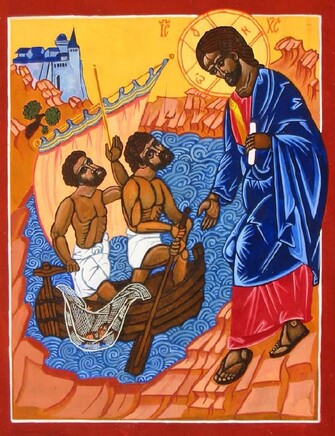
Isaiah 9:1-4; Matthew 4:12-23
From the time he was born, Jesus has been prepared for the task of leaving. Remember how Jesus’ life begins when the decree to conduct a census by of Emperor Augustus so Mary and Joseph had to leave Nazareth to be registered in Bethlehem, where Jesus was born. Mary and Joseph fled with the young child Jesus from Bethlehem to Egypt in light of the murderous threats of King Herod. Only after King Herod’s death were they safe to return back to Nazareth.
Every story we have of Jesus as he prepares to begin his public ministry includes a journey, a leave-taking of sorts. The Holy Spirit led Jesus to the wilderness to be tempted by the devil. And now, at the arrest of his cousin John, it’s time again to move on. To leave Nazareth for good which has been his home base for about 30 years. Jesus realized, and in turn taught, that ministry and discipleship means to leave behind the comfortable, the safe, the familiar and find a new home, a home in the will of God.
So, Jesus left his home to start his ministry not in Jerusalem, the “it” place where anyone of importance would want to be seen to achieve some prominence --- the text tells us that Jesus left for the ancient tribal territories of Zebulum and Naphtali. As Jesus traveled those 18 or so miles from Nazareth to the town of Capernaum, surely the history of that area came to Jesus’ mind. The ground he waked on was the stage for brutal foreign invasions over and over again, then as it is now. Assyrians, Babylonians, Persians, Romans all marched through this pivotal and vulnerable area. The land was annexed, the people exiled. The territory was more or less a deportation zone Defeat hung in the air. It was a land where over time, the population became mixed, containing both Jewish and Gentile peoples. The region was looked down upon by the Jerusalem Jewish establishment as tainted and backward.
Why didn’t Jesus pick a more hospitable place to go? A place that didn’t recall such painful memories of slavery and hardship? Why a place where families were separated, never to see home again? A place that reminds us even today of the millions of refugees in our world, swallowed up by the storms of life, caught in the middle, conflict, unable to go back, unable to move forward, home lost no place to identify with, nowhere to escape. Right from the get-go, Jesus doesn’t join up with the safe and secure. He makes a home with the uprooted and oppressed. In doing so, Jesus tells us something basic and fundamental about God. We have a who is willing to leave home. A God willing to leave the safety and comfort of heaven to join this messy, sinful, broken life on earth. God not afraid to wander with us. A God willing to take our sin upon himself. A God who shows us how to leave, how to let go in order to find a bigger world, a better place, a new spiritual home where we can follow Jesus without the past weighing us down. Jesus reveals to us a God who wants to meet us in our places where we have been trampled upon, scourged by conflict and hardship. A God, who St. Augustine says, is restless until God finds a home in us. And we find our home in God.
Our restless Jesus entered the fishing town of Capernaum on the north west shore of Lake Galilee and carried on where his cousin John left off: “Repent! For the kingdom of Good has come near” Jesus doesn’t baptize like John. He doesn’t wait by the lakeside for the crowds to appear. Jesus goes to them. He walks up to Peter and Andrew and says, “Follow me and I will make you fish for people.” He meets up with James and John and they too are called. They hear the summons and they too, leave all they knew, all that was familiar, behind.
This is how the kingdom of God grows. How true home is found. By leaving and letting go. By trusting God who leads to the broken and downcast places of the world, where God seeks to use us to bring healing and wholeness to those who are down and out.
In order to be a disciple of Jesus, we must leave. To leave behind old ways of seeing the world. To leave what is comfortable and safe behind. Where we do an about-face. Where we experience the discomfort of being uprooted, force out of a stuck position.
It’s not as easy as we think. We have a natural inclination to hunker down with what’s familiar, to cling to the past, to stay comfortable even if what we are comfortable in is a situation we have outgrown, a place is holding our potential back.
Remember how the people of Israel, living in slavery for 400 years but were freed by the power and compassion of God. Why did they say once they were barely out Egypt- the dust hadn’t even settled: They were complaining:, “If only we had died by the LORD’s hand in Egypt! There we sat around pots of meat and ate all the food we wanted, but you have brought us out into this desert to starve this entire assembly to death.” (Exodus 16:3). We yearn to turn back for one last look, like Lot’s wife, wanting one last glimpse at home. The consequence of her looking back is that she turned into a pillar of salt. It’s like when Jesus says in Luke: 9: 62: ‘No one who puts a hand to the plow and looks back is fit for service in the kingdom of God.’” Jesus is calling us forward, and we can’t move forward safely if we keep turning around, keep pining for the past, if we keep longing for what is long gone. Remember the words of the prophet Isaiah: “Forget the former things; do not dwell on the past. See, I am doing a new thing! Now it springs up; do you not perceive it? I am making a way in the wilderness and streams in the wasteland. — Isaiah 43:18–19
So, our gospel text asks us, as we embrace the mantel of discipleship, what are we being called to leave behind? Each of us has a past. A past filled with both successes and failures. A past where we are both stuck and feel safe and comfortable. One of my first jobs in ministry was working in a church program with homeless addicts. Living on the streets, consumed with getting the next high, there’s not much lower than that. Part of our tasks was to instill hope for a better future, to walk through the valleys, the ups and down of pulling a shattered life together. Like Willie who began as a volunteer in our soup kitchen, was promoted to chef, and eventually became a member of our Board of Directors. He went from a crack addict living on the streets to a college student enrolled in criminal justice studies – in his late forties. Like Shameik, also an addict constantly chasing that next hit, to becoming a respected drug and alcohol counselor, with the support and encouragement of the church. Like so many other brave men and women who take a chance on themselves, took a chance on God, and let go, and let God as the saying goes. They learned that looking back at the past, getting stuck in the has been, focusing on the mistakes, was the main obstacle to achieving their dreams, being healed, moving on. The point is, we can never find out the life God has dreamed up for us if are not willing to leave behind the old baggage, the familiar routines, all that weight that is so familiar but holds us down.
Over the past few weeks, we’ve been learning that discipleship is not easy. We learn to expect the unexpected from God. We learn that discipleship is not a popularity contest. And now we need to let go of the familiar, the comfortable, and be willing to step out into the unknown. A place where scholar Frederick Buechner says ““…God calls you to is the place where your deep gladness and the world’s deep hunger meet.” God has a place for each of us that is awesome, beyond our wildest dreams, the best of our best. To get there, we have to leave and not look back.
As the first month of a new year comes to a close, what is God calling us to leave behind? What resentments, fears long-dead dreams, do we wear like a well worn jacket, that’s getting too tight? What arguments and fights do we hold onto, insisting we are right all the time but ending up alone? What is Jesus asking you to leave behind? More important, where is Jesus calling you? To sobriety? To loving more deeply and honestly? To a more compassionate, fulfilled life connected to others? A new ministry of caring that’s been calling but we haven’t taken the risk to venture forth?
It is ours for the taking. Let go. Leave. Close that door. Don’t hesitate or look behind. Become fishers of people, helping others find their purpose, and together let us discover a loving and forgiving God, who meets us in the world’s need. A God ready to take us to places beyond what we can imagine, more than we can comprehend, an experience of heaven on earth, if we, like Jesus, let go and take the hand of God. Answer the call and move forward and discover that wherever God is, we are indeed home.



 RSS Feed
RSS Feed